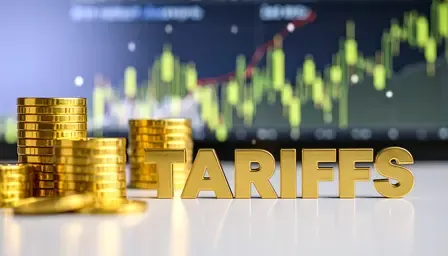Are US Tariffs a Challenge for Indian Pharma Companies?

Synopsis
Key Takeaways
- 100% US tariffs on branded and patented drugs may not hurt Indian firms significantly.
- Exports to the US largely consist of generic medicines.
- Majority of the tariff costs are likely to be passed on to consumers.
- Indian companies maintain strong balance sheets, enhancing credit quality.
- The US market represents about one-third of India's pharmaceutical exports.
New Delhi, Sep 28 (NationPress) The 100 percent US tariffs on branded and patented pharmaceutical drugs are not seen as a significant challenge for Indian drug manufacturers, according to market analysts.
This is largely because exports to the US—representing 20 percent of the Indian pharmaceuticals market—are predominantly made up of generic, off-patent medicines that likely fall outside the scope of these tariffs.
“The imposition of 100 percent tariffs by the US on imports of branded and patented pharmaceutical products, effective October 1, 2025, is not expected to drastically impact Indian drug makers,” stated Anuj Sethi, Senior Director at Crisil Ratings.
While some domestic formulation producers have a niche presence in the branded and patented drugs sector, the revenue generated from these drugs is relatively modest, he noted.
Additionally, considering the largely non-discretionary nature of these products, it is probable that most of the tariff costs will be passed on to consumers. Several of these domestic firms also have manufacturing facilities in the US, which would exempt them from the new tariffs.
“The strong balance sheets of these companies further enhance their credit quality. However, any potential imposition of further tariffs, depending on the results of the ongoing US Section 232 investigation, remains a point to watch,” added Sethi.
The increase in US tariffs primarily targets branded and patented drugs exported by multinational pharmaceutical companies like Pfizer and Novo Nordisk.
This tariff hike comes in the wake of Trump’s strong criticism of large pharmaceutical companies for the exorbitant prices they charge in the US market.
In contrast, Indian generic drugs serve as affordable alternatives to these branded medications, effectively treating conditions such as cancer and diabetes while ensuring that medicine costs remain manageable for US consumers. Approximately 40 percent of the generic drugs available in the US market are imported from India.
Indian pharmaceutical firms export around $20 billion worth of generic medicines to the US annually, with major players including Sun Pharma, Dr. Reddy’s Laboratories, Cipla, Lupin, and Aurobindo Pharma.
The US market constitutes about one-third of India’s pharmaceutical exports.









